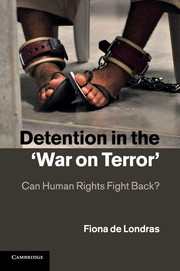Book contents
- Frontmatter
- Contents
- Acknowledgements
- Introduction
- 1 Panic, fear and counter-terrorist law-making
- 2 The right to be free from arbitrary detention
- 3 Counter-terrorist detention: the executive approach
- 4 Legislating for counter-terrorist detention
- 5 International human rights law's resilience in the face of panic
- 6 Judicial responses to counter-terrorist detention: rights-based resistance?
- Conclusion
- Bibliography
- Index
Conclusion
Published online by Cambridge University Press: 05 August 2011
- Frontmatter
- Contents
- Acknowledgements
- Introduction
- 1 Panic, fear and counter-terrorist law-making
- 2 The right to be free from arbitrary detention
- 3 Counter-terrorist detention: the executive approach
- 4 Legislating for counter-terrorist detention
- 5 International human rights law's resilience in the face of panic
- 6 Judicial responses to counter-terrorist detention: rights-based resistance?
- Conclusion
- Bibliography
- Index
Summary
As I set out in the Introduction, the purpose of this book was really to test the dominant hypotheses as to how domestic and international law would respond to counter-terrorist detention in the ‘War on Terror’. Such detention puts in serious jeopardy the right to be free from arbitrary detention and the safeguard right to challenge the lawfulness of one's detention. The answer to this question is really that in some ways the law has behaved in accordance with theoretical predictions and in other ways it has not; it is, in other words, a somewhat mixed – perhaps even messy – picture. I have tried to show that the US's and UK's political branches, i.e. the executive and legislature, have generally behaved in a panic-related manner, introducing repressive counter-terrorist law and policy against a backdrop of the discourse of crisis, emergency, novelty of risk and extremity of dangerousness. In many ways these laws and policies were clearly in breach of the international right to be free from arbitrary detention and its equivalent protections in the domestic law of both the US and the UK. International human rights law, on the other hand, seems to have displayed a somewhat unexpected degree of resilience in protecting its normative core from powerful hegemonic projections by the US and the UK. The US Supreme Court and UK House of Lords (now the UK Supreme Court) seem to have bucked their deferential trend in the cases before them that relate to counter-terrorist detention. Certainly, their approaches to such detention subject the representations of the government to significantly closer scrutiny than was the case in cases such as Korematsu and Liversidge. The question that remains, of course, is what all of this means?
- Type
- Chapter
- Information
- Detention in the 'War on Terror'Can Human Rights Fight Back?, pp. 280 - 283Publisher: Cambridge University PressPrint publication year: 2011



